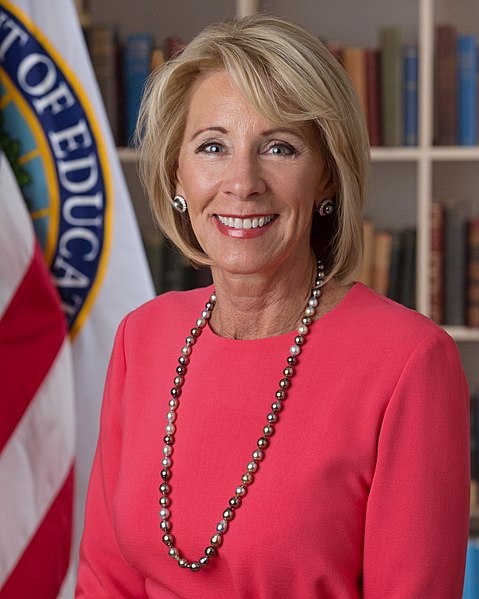THE EDUCATION Of An Education Secretary
Like most people in Washington, D.C., and other major cities, Betsy DeVos is doing her job remotely, communicating with her staff at the Department of Education through phone calls and video conferences. And oh, yeah: DeVos just revealed a new order on sexual harassment with ramifications for every corner of the country. It may very well shift the balance of campus culture — and perhaps beyond.
She said that getting into the weeds on sexual assault was not something she had thought would become perhaps the issue that defines her legacy. “By the time I was confirmed, that was certainly high on the list,” she said of the “Dear Colleague” letter.
“It wasn’t so much the letter itself,” DeVos said of her gut reaction to the fallout from what had become the new normal for students, mostly young men, facing allegations of sexual misconduct. “It was the implications of what the letter actually resulted in, and, you know, at the beginning of this process, sitting with a number of groups of individuals, of survivors who told their stories, of those who were falsely accused who told their stories, and then with college administrations and chief legal counsel and those who were charged with actually running these processes, it was heart-wrenching to hear some of the stories that I heard.” DeVos said the listening sessions with both survivors of sexual harassment and the wrongfully accused were sobering experiences. “I remember after one of them, I just had to have some quiet and space just to sort of think through and reflect on what I heard,” she said. “It was hard. It was very difficult.”
After the department reined in the guidelines in 2017, DeVos and her team began the process of drafting new ones, this time going through the legal channels that would give her rule changes the force of law, which the previous ones did not have. Immediately after DeVos announced the rule change, the Biden campaign released a statement denouncing it as an attempt to “shame and silence” sexual abuse survivors. He promised a “quick end” to it should he be elected.
DeVos’s rule changes, among other things, aim to correct what she said was a botched attempt at social engineering. “Surprising to me was when coming in just how evident it was that the previous administration had been, not only on this issue, but a host of issues, just on an epic power trip,” she said, “and were trying to inculcate every piece of their view of how culture should be into every policy of that department.” The Obama administration, with Arne Duncan as education secretary, “clearly laid the groundwork for the #BelieveAllWomen movement,” she said, “and I think you can draw a direct line from that to the whole Brett Kavanaugh confirmation process, and I don’t think that was a mistake. I think that was intentional.”
The rule changes offer a clearer definition of “sexual harassment.” The changes also lay out a process for school administrators to adjudicate sexual harassment claims, mandating a live hearing on the allegations and the right of the accused to submit evidence and witnesses as a defense. Accommodations are made for victims who do not wish to face the accused, but it is now built into the process that those facing allegations of harassment have ample opportunity to make their case.
washingtonexaminer.com-Eddie Scarry

